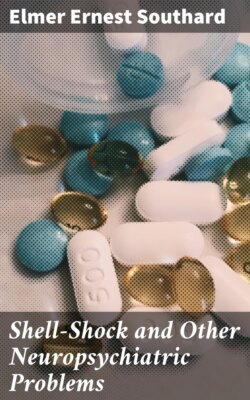Читать книгу Shell-Shock and Other Neuropsychiatric Problems - Elmer Ernest Southard - Страница 73
На сайте Литреса книга снята с продажи.
ОглавлениеTherapeutic (antityphoid inoculation) epilepsy.
Case 65. (Bonhoeffer, July, 1915.)
A volunteer without psychopathic signs except a slight stuttering, and without psychopathic history of any sort, went into service at 17. After he had been a short time in the field, a shell fragment injured him in the upper part of the thigh. He lay up in hospital four weeks. He then spent four weeks in the reserve.
He was then given antityphoid inoculation, and a half hour afterward had epileptic convulsions. These appeared four times more during the next fortnight, as a rule followed by a delirious excitement. No fever was reported. After the fourth attack, he was transferred to the Charité Clinic.
At the clinic there were no attacks, and there was nothing epileptic to discern in the make-up of the patient. His nervous system was normal to examination. There was, however, one fact in the family history of note, namely, that an older brother of the patient, 20 years of age, suffered from convulsions.
What is the relation of the antityphoid inoculation to the epilepsy? According to Bonhoeffer, we must not forget the family history even if we regard the inoculation as the liberating factor. Curiously enough, the shell injury did not itself serve apparently to bring out the epilepsy. Bonhoeffer has seen three other instances of epileptic attacks or epileptoid phenomena following antityphoid inoculation. However, in the hundreds of thousands of inoculations, it is not to be wondered at perhaps that there should be a number of instances of epileptic attacks. One was a man with severe epileptic taint; in the others, there was a question of pathological intoxication.
Re antityphoid inoculations, a French observer—Paris—remarks that these inoculations may occasionally start up the symptoms of general paresis. Compare in this connection also Case 63, in which a syphilitic developed convulsions during antisyphilitic treatment. The psychogenic factor of intravenous injection itself, with its possible effect upon glands of internal secretion, can hardly be distinguished from purely serological effects. Paris goes so far as to state that he regards it as imprudent to vaccinate a syphilitic subject. He thinks it might be better for a syphilitic subject to contract typhoid or paratyphoid fever than to run the risk of developing paresis. If the soldier happened to be not only syphilitic but alcoholic, then the danger would be larger. Possibly, however, both Bonhoeffer’s case of antityphoid inoculation epilepsy and the cases alluded to by Paris of antityphoid inoculation, are merely statistical accidents.
